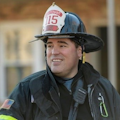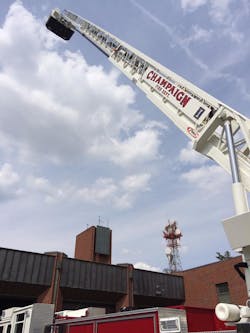“Firefighters are heroes.” We hear it all the time, from children, office-seekers, the media, etc. It’s probably something you’ve said or thought about yourself at one time or another.
Early ideas of a “hero”
The notion of heroism as embodied in one person (the “hero”) comes from Ancient Greece and, broadly, means someone who uses strength and intelligence to protect someone else. What kind of hero do you imagine yourself to be? Maybe Hector of Troy, who was the loyal son and heir apparent to his father’s kingdom, as well as being a skilled warrior and charismatic leader? Every fire department seems to have a putative Heracles: semi-divine, strong, courageous and thinking himself more ingenious than other men. If you’re not a fan of the classics, maybe you identify with King Leonidas of the book and film 300, willing to spend your life in a desperate cause in order to defend your city. Or, if you’re of a more religious mind, perhaps you recall St. Florian proclaiming to his executioners that if they burned him, he would climb to heaven on the flames.
When I think of my firefighting life, and my role as a firefighter, though, I think of another character from antiquity, perhaps one you don’t know. I recall the story of Sisyphus. Who was Sisyphus? According to his myth, he was the king of Ephyra. He was also a single-minded, driven man focused on using his own gifts to make his kingdom the best it could possibly be. Like some similarly focused firefighters, however, this drive led him to trouble. Sisyphus aroused the anger of the gods when he tricked Death into chains, so that no humans would ever die. His punishment was to role a stone up a hill, only to have it roll back down when he neared the top. He would begin again and the situation would repeat, over and over for eternity.
Subsequently, through the years, people have often described the utter futility of time-consuming tasks as Sisyphean. I think it’s valid, then, to describe the vast majority of my career, or of anybody’s, as Sisyphean—repetitive, predictable and not at all heroic—and I hope you’ll settle down while I defend that opinion.
How we spend our time
To fully explain what I mean, I’ll have to reach back several years into my own past. As part of a project in my own department, I undertook a four-month study of how the firefighters in my station spent their workday. At the time I was assigned to our rescue company in the headquarters station, easily one of the busiest spots in our department. The study took place over late summer to late fall, which I felt gave the best possible range of calls and other activities we do allowing for weather, school calendars, etc. What I found surprised me.
In the course of a 24-hour shift, my station, the busiest in the city, only spent about four hours per day on calls for service. The average length of time spent on scene at a call was 15 minutes. Approximately three hours were spent on facilities (housework, mowing, etc.), with another two hours each for vehicle and equipment maintenance and report writing. Throw in an hour for physical training and, try as I might, I could only account for about half of the shift most days. Does that mean we’re a department full of lazy employees? No, of course not. Some days were slower, some days were fuller. No one has ever asked, but I’m actually glad that we’re able to give a good accounting of our time. Like most of firefighters across the world, we work hard; we aren’t lazy. But most of the time, we also aren’t heroic.
Every fire department is different, of course, and the conclusions I’ve drawn come from my own career in my own little corner of the world. Each department must fulfill the needs of its community, and each community is different in terms of people, buildings, terrain, economy, etc. So your experience might be very different from mine, and is just as valid.
I work in a small college town, and most of my time in the street is spent on accidental and malicious false alarms, minor medical emergencies, rubbish fires and “food on the stove.” These calls are the bedrock for us, and they aren’t going away. We don’t get very many repeat customers, but I would say that the same kinds of people tend to have very similar situations in which they have to call 9-1-1. So I have a very strong sense when I pull up in front of an apartment building for a smoke odor of what I’m walking into because I’ve done it many, many times before—but don’t think I’m trying to make excuses for complacency. What I am trying to say is that, once you’ve been on the job for a while, once you really know your community, you reach a point where there’s not much variety. Do these folks still need the fire department? Yes, of course. Are they entitled to effective, professional and compassionate service, no matter why they called? No doubt.
Not to brag too much, but I believe my department hits those targets every time we roll out the door. But we are most often called to render that effective, professional and compassionate service under non-emergency or low-risk conditions. Sure, you can be justifiably proud of doing a good job for your neighbors under these circumstances, but if we think about the definition of a hero (faces danger, uses strength and wits selflessly to protect), are you really heroic?
Please don’t think that I’m trying to bag on the job here, or that this is a blast of sour grapes from a senior firefighter. I will provide a gentle retort to any member of the public whenever I hear the blanket “You guys are heroes” statement, but that doesn’t mean that I don’t have pride in what I do or ignore the fact that in very, very rare instances a life in firefighting will afford us all a chance to be truly heroic.
Taking pride in our work
I recognized fairly early on in my career that the danger and excitement was a tiny part of how we spend our days (What? Didn’t Johnny and Roy go to, like, three disasters per week?). At that point in my life, I was still learning the ropes and didn’t dwell on it too much. Thirty years is a long time, I reasoned, and my time would come. But the years pass. You miss out on promotions or new assignments, you work with good bosses and bad, and suddenly one day you’re climbing a ladder to vent a roof and wondering when your knees started to hurt so bad. You still have a long way to go, but the same calls and the same people and the same headaches are starting to drag. It becomes difficult to come to work with that old zeal. It’s hard to find the meaning in what you’re doing, and it becomes hard to have pride.
If you spend too much time in this mind space, you can become bitter. You come at the “hero myth” from a much more destructive angle. It feels a little bit like you’ve been lied to, for people to call you a hero when you think your work is all drudgery. Who lied to you? The chief? The drillmasters out at the academy? Your shift steward? In your drive to become a firefighter, did you lie to yourself, just a little? I’ve spent more time than I ought to have in that mind space—it’s a terrible, lonely place to be, especially in a collegial job like ours. But I found my way back, not to a reacceptance of the hero myth, but definitely to a sense of pride in my work—to a sense of pride in work in general, which sees me through my days.
I started working when I was 15, and I suppose I’ll be at it as long as my body holds out. I’ve bagged groceries, painted apartments, pushed brooms, and I’m pretty sure I remember how to do an OSHA safety check on a forklift. None of it was glamorous, and no one was going to write songs about it, but as a younger man, I was always proud of work done well.
I didn’t know it at the time, but I was internalizing a value that author and philosopher Robert Pirsig called “quality.” Pirsig himself couldn’t quite define it. At one time his pursuit of quality as a universal ethic drove him to the brink of madness. After several laborious (albeit enjoyable) readings of his seminal work Zen and the Art of Motorcycle Maintenance, I came to the conclusion that Pirsig was pointing his readers toward the enjoyment of simple, repetitive tasks for their own sake, and that doing those tasks well, for the sake of doing them, constituted quality.
Think for a moment, as I did, about your time on duty: the same minor calls, the washing the truck, the folding the laundry. You will do it all again, with only slight variation, every day until you promote, retire or switch jobs. That used to be a source of stress for me, but it was an enormous sense of relief to find that I could find pride and satisfaction in doing all those little things well. Dressing the tires wouldn’t win me Firefighter of the Year, but it might go a long way toward getting me through the shift feeling like I did quality work. Pulling weeds out on the apron wouldn’t get me a medal, but it would do the same thing. And so it goes, every day, until the sense of thwarted heroism passes, until it’s replaced with quiet pride, a more evolved sense of low-key professionalism when you fully understand what the job is, and what you have to do to be good at it.
Philosopher Albert Camus calls this state “contented acceptance.” Camus was a bit more pessimistic than Pirsig, and believed that someone had to acknowledge the futility of human endeavor before he or she could find this contentment. While I always believe that protecting society from fire and other risks is worthwhile, I think that I also acknowledge the futility of a firefighter’s career, generally speaking. We aren’t going to educate and engineer fires out of existence. People will still behave irresponsibly. Builders will cut corners. Your pet hazmat or tech-rescue project won’t get funded, or someone who outranks you will steal the idea. But when your feet hit the floor every morning you have to try again, because you surely won’t be happy if you stop. Fighting against the futility isn’t heroic, but it IS professional. In that sense, you or I can hold our heads high. Or, as Camus put it: “The struggle itself is enough to fill a man’s heart. One must imagine Sisyphus happy.”
About the Author

Jeremy Mitchell
A 24-year veteran of the fire service and EMS, Jeremy Mitchell serves as the deputy fire marshal of the Champaign, IL, Fire Department. He is a certified Fire Marshal, a member of the Vision 20/20 Champions and Emerging Leaders in CRR and a member of the NFPA 1037 Technical Committee.
